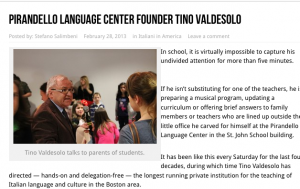Pirandello Language Center Founder: Tino Valdesolo
CLICK ON THE IMAGE FOR COMPLETE ON-LINE VERSION ON BOSTONIANO.INFO
 In school, it is virtually impossible to capture his undivided attention for more than five minutes.
In school, it is virtually impossible to capture his undivided attention for more than five minutes.
If he isn’t substituting for one of the teachers, he is preparing a musical program, updating a curriculum or offering brief answers to family members or teachers who are lined up outside the little office he carved for himself at the Pirandello Language Center in the St. John School building.
It has been like this every Saturday for the last four decades, during which time Tino Valdesolo has directed — hands-on and delegation-free — the longest running private institution for the teaching of Italian language and culture in the Boston area.
So we met him at his nice half-brick, half-wood house in the wooded suburb of Andover, with almost the same result. A former biology teacher born on the outskirts of Vicenza, Italy, 64 years ago, Tino has participated in a dozen marathons, and his training as a long-distance runner stands him in good stead. Dressed in a full sweat suit, he scrambles around the house to get coffee, answer the phone, and accept a package at the door for his home business exporting dental implant devices to Italy.
“It is one of the things I do,” he says during a rare pause in his scrambling. Then, as fleet of mind as he is of foot, he sprints back nearly a half a century to when he was 19 years old and pursuing a master’s in theology at Harvard Divinity School, and then to a couple of years later, when he became an “outlaw” in both Italy and America.
“I wanted to remain here,” he recalls, “which made me automatically a deserter in Italy, where military service was still mandatory.” Living in America, but no longer a student, his immigration status needed “fixing,” but that was taken care of with a short trip to Canada and subsequent enrollment in a course at Boston University dedicated to biology, a subject he would teach in high school for 21 years.
“Some people think religion starts when science ends, but I think they run on parallel tracks,” he digresses.
Then along came the deal of the century. “While I was still in school the Consul General of Italy, Franco Faa’ di Bruno, came to speak at Boston University,” Tino recalls.
“At the end of his presentation, he called my name, saying he knew about my situation, and offering to help me in exchange for asssiting him in starting an Italian school for the children of immigrants.” It turned out to be a “pleasant blackmail,” he says with a huge a smile.
The school opened in 1973 in the prefect location, both then and now: the St John School building across from Sacred Heart Church in the very heart of the North End. In the meantime, the consul general made a couple of calls and Tino was issued an honorable discharge from the Italian Army due to “serious family problems” that have yet to be fully determined.
Since then, the school and its founder/director have not missed a beat. Generations first of of Italians; then of Italian Americans; and now of an ecumenical mix from about 20 countries roam the halls under Tino’s tirelessly watchful eye and energetic if sometimes authoritarian direction.
As the curriculum gradually shifted from exclusively linguistic to increasingly cultural, attendance grew, with a peak two years ago after the Dante Alighieri Society shut down its Saturday morning children’s program. The student body now includes 150 young students, 4 to 16 years of age, plus assorted parents who take advantage, for a little extra charge, of adult Italian classes.
“That blackmail was pleasant in many ways,” says Tino, who currently is in the process of planning a 40th-anniversary dinner on the school premises involving all former students and teachers. “The school, on top of being at first a solid resume builder for my teaching career, allowed me to take the exact pulse of the Italian community for all these years, and be in contact with myriad wonderful people I would not have met otherwise.”
As a teacher himself, he doesn’t skimp on praise for his instructors, many of whom are former students who came back to help. “It is not easy to get up early on a Saturday after having worked all week, especially in the winter,” he explains.
“They’re paid, but what I give them honestly doesn’t cover half of their efforts. Their gratification does not come from money, but rather from seeing these kids come back year after year speaking more and more Italian.”
In addition to managing this “Saturday morning rush hour,” Tino stages an annual Christmas pageant that involves nearly 90 percent of the school and boldly includes a full Catholic Mass that attracts the participation of children of all ages and all faiths. And then there’s the gala end-of-the-year program that leaders from across the community, the consul general included, wouldn’t miss for the world.
The only problem, according to Tino — and definitely not an urgent one yet — is the small matter of succession. As with anyone who has a hard time delegating, designating an heir is no simple task. “It’s not that I don’t trust others,” he explains. “I just haven’t yet found anyone worthy of … a pleasant blackmail!”
